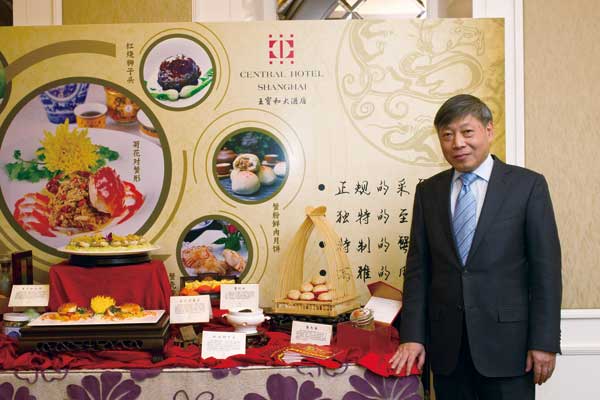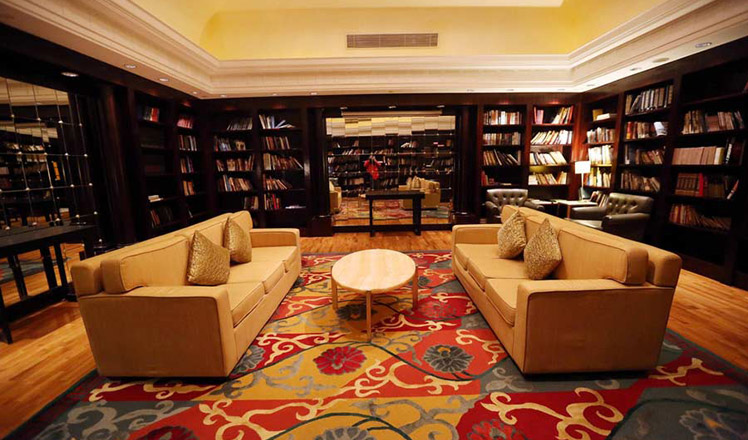A cross-Straits recipe for success
Updated: 2016-01-30 03:13
By WANG YING in Shanghai(China Daily USA)
|
||||||||
 |
|
Zhang Guosheng, general manager of Shanghai Wang Bao He, believes that good food is one of the keys to promoting cross-Straits communication. Gao Erqiang / China Daily |
Banking on what its brand is most famous for, Wang Bao He effectively expanded its reach across the sea to neighboring Taiwan
Most people his age would have continued with their jobs all the way to retirement but Zhang Guosheng decided that it was never too old to seek new challenges in life.
Having worked for State-owned companies for 30 years, Zhang left his comfort zone and made the foray into the hospitality industry on March 5, 2014, taking up the role of general manager at Shanghai Wang Bao He Co Ltd, a company that manages two star hotels and two restaurants in Shanghai and Beijing. Furthermore, Zhang had entered the industry at a time when domestic hotels were facing a business slump amid slower economic growth.
"This is a totally different area for me and it presents a great challenge for someone my age who has been accustomed to the system and workflow of State-owned companies," said the 52-year-old.
According to data from the China National Tourism Administration, the average daily rate (ADR) of five-star hotels was 629 yuan ($95.6) in the third quarter of 2015, down 2.2 percent year-on-year, with the occupancy rate staying at low levels of 59.8 percent. For four-star hotels, the figures were rather dismal too.
In order to expand Wang Bao He's business, which was already well-known locally, Zhang and his team decided to focus on what the brand is famous for — its crabs and rice wine. The company's roots can be traced all the way back to 1744 when the first Wang Bao He tavern was opened by Wang Guichen. The brand has since its inception been famed for being a "rice wine expert" and "crab master".
Realizing that people across the East China Sea in Taiwan were not particularly aware of the brand, Zhang decided to make them the primary target audience. The first step was taken in May 2015 when delegates from Central Hotel Shanghai, a four-star establishment affiliated to Wang Bao He, paid a visit to the Grand Hotel Taipei and proposed a collaboration.
Following months of constant email communication, Zhang took his team and their famous hairy crab dishes to the Grand Hotel Taipei in October, and it instantly won over the local gourmands.
During a week-long promotional event in Taiwan, Zhang managed to generate about 130,000 yuan worth of sales revenue from the sale of these famous dishes. The crab feast also attracted big names, including Morris Chang, chairman of Taiwan Semiconductor Manufacturing Co Ltd, the world's first dedicated semiconductor foundry.
"The feast turned out to be such a success that the dining area was full every day. More than 100 guests had made reservations before the event started," said Johnson Chiang, president of Grand Hotel, Taipei.
Having noticed Grand Hotel Taipei's interest in making dim sum using the highly popular hairy crabs, Zhang got his chefs to teach their counterparts how to make mini steamed buns stuffed with crab roe and pork, mini dumplings with crab meat and pork, as well as crab shell cakes. In return, Taipei's chefs taught their counterparts from the mainland how to create authentic Taiwan dishes.
"Thanks to Wang Bao He's chefs, our mini pork buns with crab roe have become the must-order item in our hotel," said Chiang.
The successful event has since spurred the two hotels to work together more often. On Jan 20 this year, the two reached a collaboration agreement which states that such culinary exchanges will be held every March and October, starting this year.
Taiwan-style dishes from the Grand Hotel Taipei, including Madame Chiang Kai-shek's favored red bean muffin, will be available at the Central Hotel Shanghai for five days starting Mar 23, 2016. There are about 300,000 Taiwan people who are living and working in Shanghai and Zhang said that this will help to create a customer base for Taiwan-style dishes in the city.
"Fine food is the best way to promote cross-Straits communication. We hope that this partnership will be long-lasting," said Chiang.
He Jianmin, a professor specializing in tourism management at Shanghai University of Finance and Economics, said that such a way of tourism marketing should be encouraged among hotels, seeing how many people travel between the Chinese mainland and Taiwan. He said that the two establishments should also look into sharing their customers and management resources in the future.
About 4.15 million trips were made to Taiwan by tourists from the Chinese mainland in 2015, and Chinese travelers were projected to have generated about 230 billion New Taiwan dollars ($6.9 billion) worth in sales for the island last year, according to a report from www.taiwan.cn, which is affiliated to the Taiwan Affairs Office of the State Council of China.
Apart from cooperating with Grand Hotel Taipei, the Central Hotel Shanghai is also looking to establish similar collaborations with hotels in Hong Kong and Tokyo, said Zhang.
The two hotels under Wang Bao He are currently undergoing changes and the goal is to find a better balance in ADR and occupancy rates so that the hotels can have an 8 percent growth in revenue this year. Zhang is confident that this can be achieved, thanks to the company's new revenue management software and the large amount of tourists expected to turn up to visit the upcoming Shanghai Disney Resort.
- Students must learn safety education, experts say
- 73 bodies recovered from rubble of Shenzhen landslide
- Chinese travelers lead 2015 global outbound tourism
- S Korea to issue 10-year visa to highly-educated Chinese tourists
- A glimpse of Spring Rush: little migrant birds on the way home
- Policy puts focus on genuine artistic students
- Negotiating political transition in Syria 'possible': Hollande
- At least three killed in light plane crashes in Australia
- BOJ further eases monetary policy, delays inflation target
- DPRK may have tested components of hydrogen bomb
- Goodwill sets tone at Wang, Kerry's briefing
- Obama picks new Afghan commander

 Djokovic puts down Federer fightback to reach final
Djokovic puts down Federer fightback to reach final
 Treasures from Romania shine in Beijing museum
Treasures from Romania shine in Beijing museum
 First container train links China to Middle East
First container train links China to Middle East
 'Monkey King' performs dragon dance in underwater tunnel in Tianjin
'Monkey King' performs dragon dance in underwater tunnel in Tianjin
 The odd but interesting life of a panda breeder
The odd but interesting life of a panda breeder
 Top 10 best selling cars on Chinese mainland 2015
Top 10 best selling cars on Chinese mainland 2015
 Warm memories in the cold winter
Warm memories in the cold winter
 The world's highest library
The world's highest library
Most Viewed
Editor's Picks

|

|

|

|

|

|
Today's Top News
National Art Museum showing 400 puppets in new exhibition
Finest Chinese porcelains expected to fetch over $28 million
Monkey portraits by Chinese ink painting masters
Beijing's movie fans in for new experience
Obama to deliver final State of the Union speech
Shooting rampage at US social services agency leaves 14 dead
Chinese bargain hunters are changing the retail game
Chinese president arrives in Turkey for G20 summit
US Weekly

|

|








